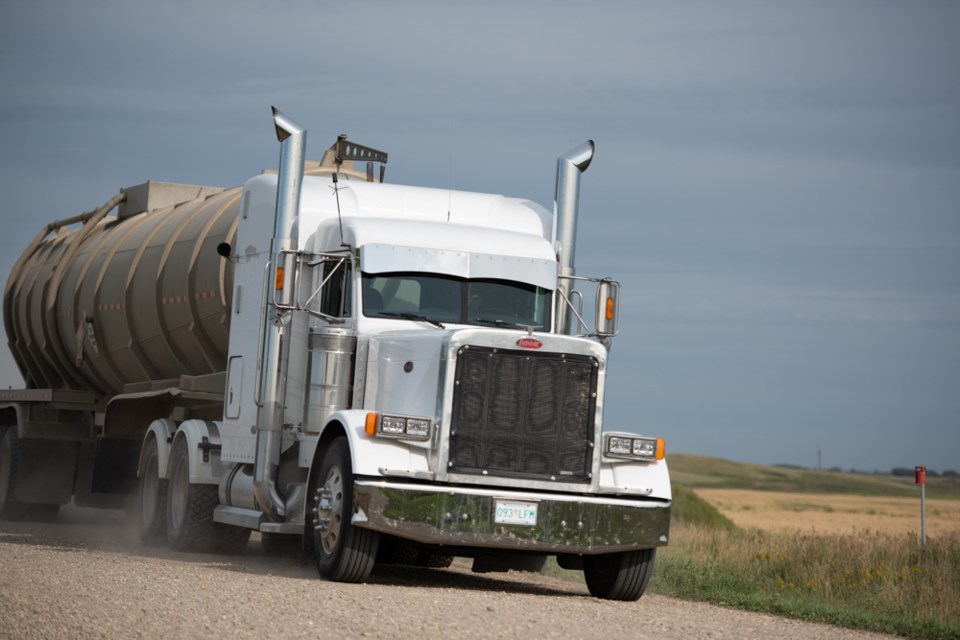Oxbow – Registered nurse Shirley Galloway, who has decades of experience in industrial hygiene, occupational health and safety, has some pointers on how keep working in the oilfield in the age of COVID-19. This week she looks at tank trucks.
“We need to be grateful for our truck drivers, including our tank truck drivers,” she said on April 2, noting that she has observed a lower amount of truck traffic.
The principles of social distancing, keeping things clean and disinfecting all you touch are continual refrains in Galloway’s advice, and it starts at the beginning of a shift, when you approach your truck.
“Going to the shop in the morning, their greatest risk is touching things others have touched,” she said. As such, she recommends using latex gloves and a bottle of disinfectant.
Disinfectant doesn’t work well on soiled surfaces, however, so it’s important that surfaces that have visible dirt, like door handles, be cleaned first with soap and water before applying a disinfectant. That includes your hands as well. The U.S. government has posted a list of approved products that are known to work for COVID-19. While Spray Nine, commonly used in the oilpatch, is not on that list, she said it is known to kill similar viruses.
“When they go to the vehicle, outside or in the shop, keep physical distance,” she said.
Cleaning inside the truck, use a Lysol or Spray Nine cleaner. It’s important to let it soak on the surfaces at least 60 seconds before wiping the cleaner off, otherwise you will reduce its effectiveness. Do the outside door handle, the inside handle, steering wheel, shifter, etc.
And once you’ve cleaned something on your truck, make sure no one else touches it, either.
Be cognizant that using the same gloves from one area to another can lead to cross contamination. Ideally, it would be best to switch gloves, but supplies are limited and difficult to come by.
Dispose of your gloves when done. Once you’ve used your gloves, to open your door, for instance, it’s important to throw them out. Remember taking your first aid recertification, where they show you how to remove latex gloves without getting blood on your hands? Use the same sort of technique, turning them inside out as you take them off. Wash or sanitize your hands after removal.
Asked about nitrile (i.e. rubber) gloves, she said they can be washed with soap and water, but need to be dried and then cleaned with a disinfectant.
When washing your hands, be sure to wash your thumbs as well. When using hand sanitizer, use a “thumb-sized” amount, she said.
And don’t allow yourself to get a false sense of security from using gloves. That’s especially important when it comes to your face. “Do not touch your face!” she emphasized. Using gloves and disinfecting everything doesn’t help a lot if you then touch your face with contaminated gloves.
When fueling up, realize that anything you’re about to touch has likely be touched by others, so wipe it down. Sanitize keypads and nozzles when refuelling. Wear gloves.
When meeting people on a lease, keep your distance.
On a lease, drivers will likely be touching hoses, valves, connections and meters. Galloway recommends cleaning them with a Lysol cleaner and leave on for 60 seconds before wiping it down and touching them. If you’re going to touch it, clean it, essentially.
She does not recommend bleach solutions. Sodium hypochlorite is a strong oxidizer and, when mixed with organic materials such as diesel fuel oil, undergoes an exothermic reaction that generates heat and releases chlorine gas, sometimes violently.
Drivers should stick to their own units if at all possible. If multiple drivers are going to be using the same truck, they must be thoroughly cleaned between drivers.
“If not, have a detailed cleaning procedure between users if trucks are shared,” Galloway said.
“Infection control, at this point in time, is huge.”
When it comes to paperwork, bring your own pen(s). What do people often do with pens? Stick them in their mouths. So do you want to pick up someone else’s pen? Don’t share clipboards, either, although people aren’t likely to be chewing on those.
When you are handwashing, do so for 20 seconds. Again, don’t forget the thumbs.
At the end of the day don’t congregate in groups at the shop, or in the coffee room, especially small ones.
Don’t take your coveralls home, either.
And if you have possible symptoms of COVID-19, most notably a fever and cough, do not go to work. Stay home.




